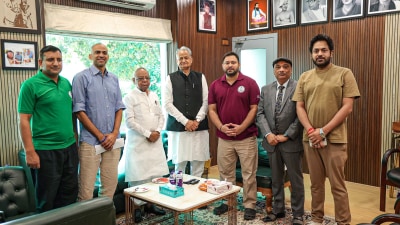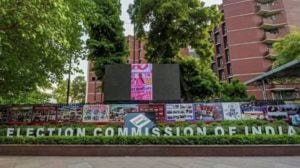Ritu Sarin is Executive Editor (News and Investigations) at The Indian Express group. Her areas of specialisation include internal security, money laundering and corruption. Sarin is one of India’s most renowned reporters and has a career in journalism of over four decades. She is a member of the International Consortium of Investigative Journalists (ICIJ) since 1999 and since early 2023, a member of its Board of Directors. She has also been a founder member of the ICIJ Network Committee (INC). She has, to begin with, alone, and later led teams which have worked on ICIJ’s Offshore Leaks, Swiss Leaks, the Pulitzer Prize winning Panama Papers, Paradise Papers, Implant Files, Fincen Files, Pandora Papers, the Uber Files and Deforestation Inc. She has conducted investigative journalism workshops and addressed investigative journalism conferences with a specialisation on collaborative journalism in several countries. ... Read More
Minorities panel takes up cause of Indian refugees
NEW DELHI, JAN 23: After succeeding in bringing the RSS leadership to the discussion table, the Minorities Commission has taken up cudgels...

NEW DELHI, JAN 23: After succeeding in bringing the RSS leadership to the discussion table, the Minorities Commission has taken up cudgels on a fresh issue. The Commission has complained to the the Ministry of Home Affairs (MHA) and Ministry of External Affairs (MEA) about the plight of Indian refugees who have arrived from Afghanistan, who they say are living in penury like ‘‘floating’’ citizens in India.
The intervention of the Minorities Commission comes shortly after the Afghan refugees have floated an association and stepped up their campaign for obtaining Indian citizenship. Says Nanak Singh, General Secretary of the Afghan Hindu Sikh Welfare Society, ‘‘A majority of us migrated here after the law and order in Afghanistan became a threat to our lives. Ever since then, we have been denied Indian citizenship and been caught in between corrupt officials and touts.’’
According to officials in the Minority Commission, a majority of the Afghan refugees are Sikhs but they also included a large number of Hindus. An internal Commission note on their status describes how about 30,000 of the Indian left Afghanistan due to the political upheaval and that the rest are unable to get out since they cannot get visas and there is no Indian Embassy in Kabul. The Commission has suggested that the refugees may either be granted Indian citizenship or granted permanent visas or identity cards like the Tibetan refugees have been given.
In August last year, the Minorities Commission first raised this issue with Lalit Mansingh, the then Foreign Secretary.
In its letter, the Commission pointed out that the Afghan refugees have to queue up at the MEA’s visa office and get their visa extended every six months while the Indians lift behind in Jalalabad were finding it difficult to return back home. The letter, written by Tarlochan Singh, the Commission’s Vice Chairman, asked for a policy to be formulated to help the refugees.
Tarlochan Singh says that since the numbers involved were so small (40,000, in all) the Commission was hoping the Government would resolve the issue soon. ‘‘If the Government can issue permits to the Tibetan refugees, why not the Afghanis?’’ he asked. ‘‘These refugees should either be given citizenship or permits and be taken out of the clutches of touts and visa officers.’’
In one representation received by the Minorities Commission, an association of the refugees have recalled that they started returning home once the civil war began in Afghanistan and peaked in 1992, when in the wake of the Babri Masjid demolition, several temples and gurdwaras were attacked and looted.
While they were initially given a one year stay permit, they now had to renew their passports every six months from the Embassy in Afghanistan. Among them, several families were forced to migrate to European countries and now are not given visas to visit India.
Bemoans Nanak Singh, ‘‘Hundreds of members of our association are those people who ran away from Afghanistan just with their jewellery.
Now they are living like beggars and are suffering a huge identity crisis. It’s time the Government stepped in and did something.’’





- 01
- 02
- 03
- 04
- 05



























